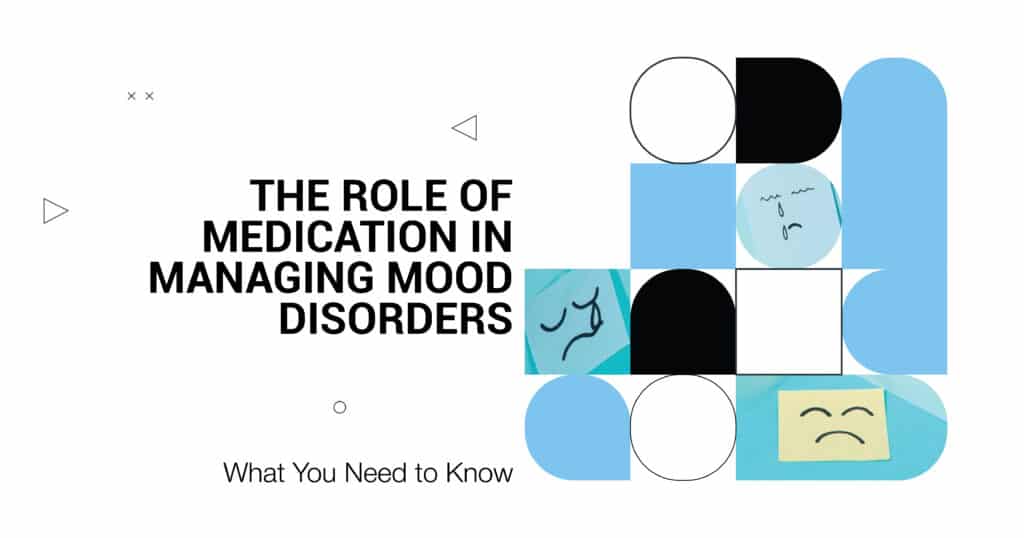Mood disorders can feel like a roller coaster, with ups and downs that make life unpredictable and challenging. Whether it’s depression, bipolar disorder, or another condition, managing mood disorders often involves a mix of therapy and medication. But how do you navigate the medication maze? What do you need to know to make informed decisions? In this article, we’ll dive into the role of medication in managing mood disorders, shedding light on the benefits, potential side effects, and critical considerations to help you or your loved one find a smoother path to stability.
What Are Mood Disorders?
Before we delve into the specifics of medication, let’s first understand what mood disorders are. Mood disorders are mental health conditions characterized by significant changes in mood, affecting a person’s emotional state. Some common mood disorders include:
- Major Depressive Disorder (MDD): Persistent feelings of sadness and loss of interest.
- Bipolar Disorder: Extreme mood swings, including manic and depressive episodes.
- Dysthymia: A severe form of depression with less severe but longer-lasting symptoms.
- Cyclothymic Disorder: The moderate form of bipolar disorder with less intense mood swings.
The Role of Medication in Managing Mood Disorders: What You Need to Know
Medication can be a game-changer for those grappling with mood disorders. It’s not a cure-all, but it can significantly improve quality of life. Here’s a breakdown of what you need to know:
Types of Medications
Different medications serve different purposes when it comes to managing mood disorders. Here are the primary types:
1. Antidepressants: These are commonly prescribed for depression and anxiety. They help balance chemicals in the brain that impact mood and emotions. Common types include SSRIs (Selective Serotonin Reuptake Inhibitors) and SNRIs (Serotonin and Norepinephrine Reuptake Inhibitors).
2. Mood Stabilizers: Often used for bipolar disorder, these medications help control mood swings. Lithium is a well-known mood stabilizer, but there are others like valproate and carbamazepine.
3. Antipsychotics: These can be used to treat severe depression or bipolar disorder, mainly when symptoms include psychosis. They can also be used as mood stabilizers.
4. Anxiolytics: Medications that help reduce anxiety, which often coexist with mood disorders. Benzodiazepines are a common type, though they are commonly prescribed for short-term use due to their addictive potential.
How Do These Medications Work?
Each type of medication works differently in the brain:
Antidepressants Increase certain neurotransmitters, like serotonin and norepinephrine, which can help elevate mood and emotion regulation.
– Mood Stabilizers: Affect the flow of sodium through nerve and muscle cells, which helps stabilize mood.
– Antipsychotics: Alter the effects of neurotransmitters in the brain, particularly dopamine, to help reduce symptoms of psychosis and mood swings.
Anxiolytics: These enhance the effect of a neurotransmitter called GABA, which gives calming effect on the brain.
Potential Side Effects
Like all medications, those used to treat mood disorders come with potential side effects. It’s important to discuss these with your healthcare provider. Some common side effects include:
– Antidepressants: Nausea, weight gain, sexual dysfunction, insomnia.
– Mood Stabilizers: Weight gain, tremors, increased thirst, cognitive dulling.
– Antipsychotics: Weight gain, drowsiness, dizziness, metabolic changes.
– Anxiolytics: Drowsiness, dizziness, dependence, withdrawal symptoms.
Managing Expectations and Medication
Starting medication for a mood disorder isn’t an instant fix. It often requires patience and ongoing communication with your healthcare provider. Here are some tips to help manage expectations:
Patience Is Key
Medications can take several weeks to start working. Giving them time is essential; you should only get discouraged if you see immediate improvements.
Open Communication
Keep an open line of communication with your healthcare provider. Report any side effects or concerns promptly. Adjustments in dosage or switching medications might be necessary.
Medication Adherence
Taking your medication as prescribed is very important for it to be effective. Missing doses can worsen your condition.
Lifestyle and Therapy
Medication is often most effective when combined with lifestyle changes and therapy. Regular exercise, a healthy diet, and cognitive-behavioral therapy (CBT) can all enhance the benefits of medication.
Common Questions About Medication for Mood Disorders
What if the medication doesn’t work for me?
It’s not uncommon for the first medication to be ineffective. Finding the right one might take some trial and error. Always work closely with your healthcare provider to adjust your treatment plan.
Can I stop taking my medication once I feel better?
Stopping medication suddenly can lead to withdrawal symptoms and a return of mood disorder symptoms. Always consult your healthcare provider before altering your medication regimen.
Are there natural alternatives to medication?
While some people explore natural alternatives like supplements or herbal remedies, it’s essential to discuss these with your healthcare provider to make sure that they are safe and won’t interact with your prescribed medications.
How long will I need to take medication?
The duration of medication use varies from person to person. Some might need it for a few months, while others may require long-term treatment. Your healthcare professional can guide you based on your specific situation.
Conclusion
Managing mood disorders with medication can be a complex but ultimately rewarding journey. It requires patience, communication, and a holistic approach, including lifestyle changes and therapy. By understanding the role of medication and working closely with your healthcare professional, you can find a treatment plan that helps you lead a more stable and fulfilling life. Remember, you’re not alone in this journey; help is available. If you or a loved one is experiencing mental health issues, talk to our team and see how we can help.
FAQs
What are the most common medications for mood disorders?
Antidepressants, mood stabilizers, antipsychotics, and anxiolytics are commonly prescribed to manage mood disorders.
How long does it take for mood disorder medications to work?
It can take a couple of weeks for medications to start showing their full effects.
Are there side effects to taking medication for mood disorders?
Potential side effects include nausea, weight gain, dizziness, and drowsiness.
Can I combine medication with therapy?
Absolutely. Combining medication with therapy often give the best results for managing mood disorders.
What should I do if I miss a dose of my medication?
If you accidentally miss taking your medication, try to take it as soon as you remember. However, if it’s close to your next scheduled dose, don’t double up by taking two doses at once. That could be harmful. Just wait until your next regular dose time.
Navigating the medication maze for mood disorders can be challenging, but with the correct information and support, you can find your way to better mental health.








